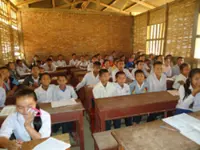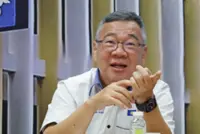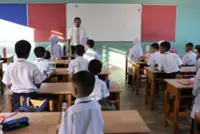AI in Asean: (Seated, front row from left to right) Malaysia Public Sector at Amazon Web Services (AWS) account director (Central Government) Suryani Md Hanipah, AWS Regional Higher Education lead, Asia Pacific and Japan Hannah Gapes, Malaysian Digital Economy Corporation chief strategy officer Datuk Fadzli Abdul Wahit, Parmjit, Prof Azlinda and APU digital learning hub director and Unesco chair Prof Dr Abtar Darshan Singh posing for a photo with summit participants.
TO tackle challenges of artificial intelligence (AI) integration, the Higher Education Ministry is upskilling educators, developing robust ethical standards for AI use, and ensuring that every student, regardless of their background, has access to AI-enhanced education.
These programmes were initiated to address AI integration challenges, including bridging the digital divide, the need for extensive teacher training, and ethical implications, said Higher Education director-general Prof Dr Azlinda Azman during her keynote address at the inaugural Asean Stakeholder Summit on GenAI for Education at Asia Pacific University of Technology & Innovation (APU).
Themed “Unlocking the AI Frontier in Asean Education”, the summit, held on May 14 and 15, highlighted the urgency to provide personalised learning, increase student engagement, and promote educational equity access to everyone in the South-East Asia region.
Understanding the context of technology in education of South-East Asia, said Southeast Asian Ministers of Education Organisation (Seameo) secretariat director Datuk Dr Habibah Abdul Rahim, will provide a better perspective on how to approach generative AI (GenAI) and its potential to reshape teaching and learning.
Technology, she said, has changed the teaching profession in South-East Asia, particularly during the Covid-19 pandemic.
The growth of multiple teaching and assessment resources and digital applications for interacting with students was accelerated but there were still barriers that prevented teachers from maximising the use technology, she said in a video address.
Habibah said with costly software licences, teachers in the region lack adequate support for technology implementation due to insufficient training.
These issues, she said, must be addressed to ensure that GenAI promotes positive change instead of worsening existing inequities.
Malaysian Association of Private Colleges and Universities (Mapcu) president Datuk Parmjit Singh said successful AI integration requires not only technology adoption, but also a shift in leadership approach.
Parmjit, who is also the varsity’s co-founder and chief executive officer, stressed the need for education leaders to cultivate innovation, encourage staff to utilise GenAI, invest in professional development for effective tool use, and exemplify adaptability and risk-taking for educational excellence.
Presenting a summary of the Asean Stakeholder Summit 2024 survey on the ideas, concerns and expectations of learners and teachers in the region, Dr Vaikunthan Rajaratnam said the common key challenge among the nations is the lack of GenAI knowledge and skills.
Dr Vaikunthan, who is APU adjunct professor for innovative digital learning, said Asean is a diverse region with different cultures, languages and educational systems, and providing teachers with innovative tools and methods will unlock the potential of AI to enhance learning across the region.
“The recurring theme is the lack of knowledge and skills in GenAI, which the United Nations Educational, Scientific and Cultural Organisation (Unesco) chair at APU has been addressing over the past year.
“We have trained some 4,000 people from 13 countries on using GenAI in daily practice, focusing on accessibility, availability, content monitoring and accuracy,” said Dr Vaikunthan, who is a surgeon in Singapore.
Moving forward, the integration of GenAI into education will require a deeper understanding of the impact and context of technology in education of South-East Asia, he said.
“This will help us understand how to approach GenAI and to recommend its ethical, equitable and effective use in education,” he said.
Agreeing, Seameo Bangkok secretariat policy and planning specialist Emiljohn Sentillas said collectively, each country’s context is crucial as evidence on the impact of edutech is limited in the region.
“Ministries collect data on technology in education but rarely analyse its impact on learning. We want to improve, innovate and expand its use, but it must be done ethically and in line with our local context,” he added.





